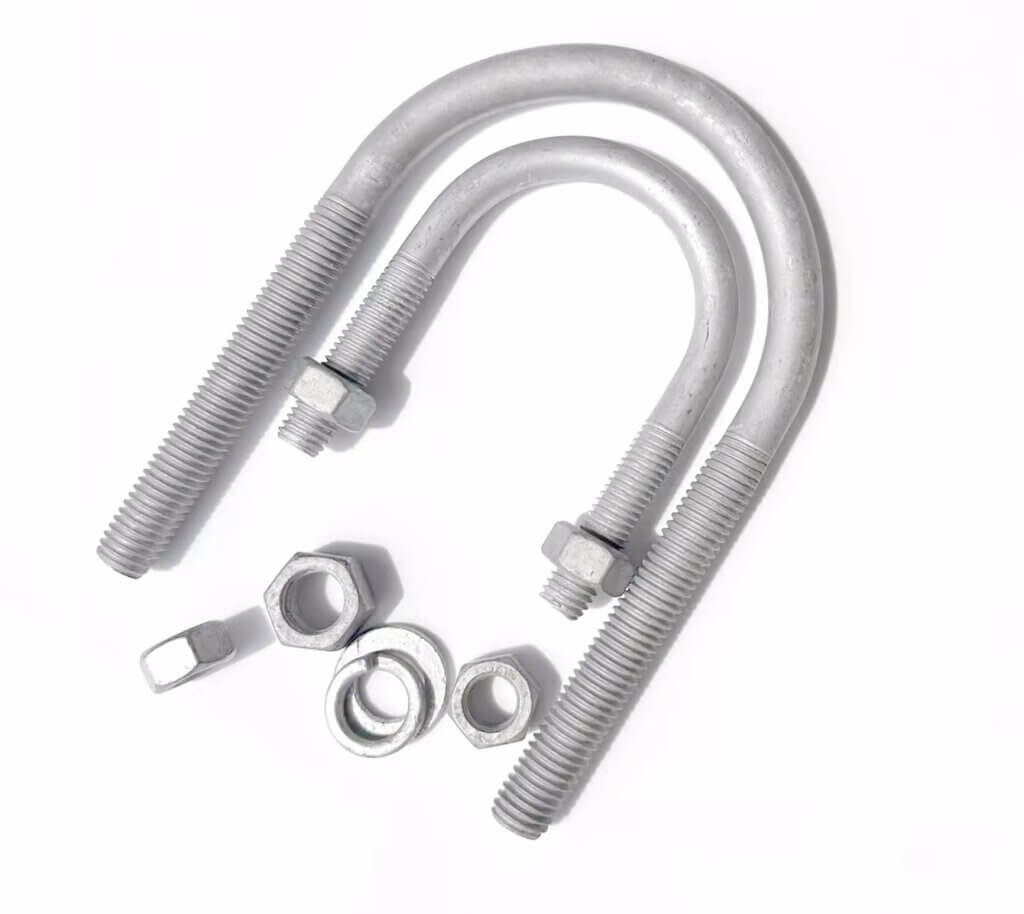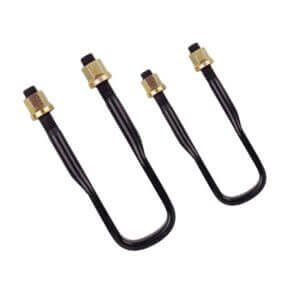
U-shaped Bolts On Cars are commonly used in the following parts of automobiles:
Body structure:U-bolts are used to fix various components of the body structure, such as the body frame, support beams, and crossbeams.
They help maintain the stability and structural integrity of the vehicle body.
Doors and windows: U-bolts are used to secure components of doors and windows, such as door locks, window frames, and handles.
They ensure the safety and reliability of car doors and windows.
Chassis components: U-bolts are used to connect components of the chassis, such as suspension systems, braking systems, and steering systems.
They help maintain the stability and safety of the chassis.
Engine and transmission system: U-bolts are used to secure components of the engine and transmission system, such as engine mounts, transmission boxes, and shafts.
They ensure firm fixation of the engine and transmission system to provide smooth power transmission.
Interior and decorative parts: U-bolts are also used to install interior and decorative parts of cars, such as seats, dashboard, center console, and roof lining.
They ensure the safe fixation and stable position of these components.
It should be noted that the specific location of using U-bolts may vary depending on the vehicle model and manufacturer.
Different vehicles may use different bolt types and specifications to adapt to specific designs and requirements.
Therefore, when carrying out car maintenance and installation, appropriate bolts should be selected and used according to the specific requirements and relevant guidelines of the vehicle.

U-shaped Bolts On CarsThe specifications and dimensions of type bolts usually vary depending on different vehicle models and manufacturers.
Different vehicle manufacturers may choose different bolt specifications and sizes based on their design and engineering needs.
The specifications and dimensions of U-bolts involve many aspects, including bolt diameter, thread type, length, material, etc.
The selection of these parameters depends on the requirements of the fixed components, such as the required strength, load bearing capacity, and safety.
Therefore, when conducting car repairs and replacing bolts, it is recommended to refer to the manufacturer’s manual, technical specifications,
or relevant guidelines for specific vehicles to ensure the correct bolt specifications and sizes are selected.
This can ensure that the bolts match the design and requirements of the vehicle to ensure safe and reliable fixation.
Here are some common bolt materials and their performance characteristics:
Carbon steel: Carbon steel bolts are one of the most common choices. They have good strength and rigidity, and are relatively cost-effective.
However, carbon steel bolts are susceptible to corrosion and oxidation, so additional protective measures may be required in environments that require corrosion resistance.
Stainless steel: Stainless steel bolts have good corrosion resistance. They are suitable for environments that require corrosion resistance,
such as marine environments or humid environments. Stainless steel bolts come in various grades, such as A2 (304 stainless steel) and A4 (316 stainless steel),
which have different corrosion resistance and strength.
Alloy steel: Alloy steel bolts have higher strength and tensile resistance, making them suitable for applications that require higher load bearing capacity.
They are usually used to withstand stronger connecting components.
Copper and brass: Copper and brass bolts are used in some special applications. They have good conductivity and thermal conductivity,
making them suitable for applications that require these characteristics, such as electrical connections.
Titanium alloy: Titanium alloy bolts have excellent strength and corrosion resistance, and are relatively lightweight.
They are used in applications that require high strength and lightweight, such as in the aerospace industry.
When selecting bolt materials, specific application requirements need to be considered, including load bearing capacity, corrosion resistance, temperature environment, etc.
Suitable bolt materials can ensure the strength, durability, and reliability of the connection.
It is recommended to choose appropriate bolt materials based on specific application requirements and relevant specifications.

No. 51-3, Park South Road, Qingyang Town, Jiangyin City, Jiangsu Province, China
To make it easier for you to receive a quote, simply leave your information, and we will contact you as soon as possible.